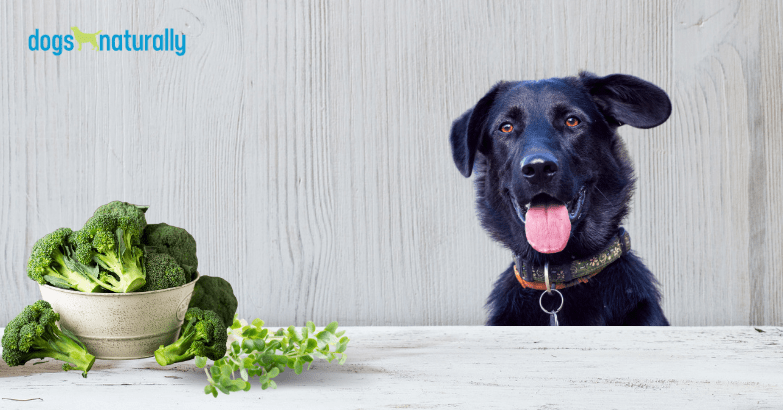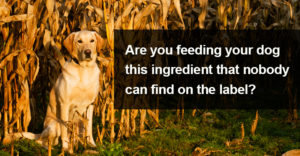The Crown Jewel of Nutrition … that’s what the health world calls broccoli. And it’s no surprise! Broccoli is one of the most nutrition-packed vegetables out there. That makes broccoli the perfect addition for any dish, including your dog’s.
And not just because of its cancer-fighting ability (which you may be familiar with). There are many more reasons you should be reaching for this cruciferous vegetable.
Is Broccoli Good For Dogs?
Yes, broccoli is an excellent addition to your dog’s dish. And broccoli sprouts are even better.
Broccoli is full of nutrients that make it a great choice for your dog. It’s also low in fat, low in sugar and has more protein than other vegetables.
But these aren’t the real reasons your dog should eat broccoli …
10 Important Reasons Your Dog Should Eat Broccoli
Let’s dive right into why your dog should eat broccoli and how to safely add it to his diet.
1. Prevents Oxidative Stress
One major cause of cancer and chronic disease is oxidative stress.
Oxidative stress happens when there’s a buildup of free radicals. Free radicals are unstable molecules and a byproduct of metabolism. They are also created by external factors like pollution and second-hand smoke.
Antioxidants stabilize these molecules to protect your dog’s cells.
If your dog doesn’t have enough antioxidants … the free radicals will run rampant. They’ll attack his cells and damage DNA, proteins and cell membranes. This can lead to …
- Cancer
- Premature aging
- Heart disease
- Brain disorders
- Other chronic diseases
Broccoli is a powerful antioxidant because it contains two important compounds.
The first is vitamin C.
Vitamin C is an antioxidant that scavenges free radicals. It’s also an excellent tool for strengthening the immune system.
Dogs produce their own vitamin C but sometimes they need a boost … especially if they’re sick, stressed or in their senior years.
If you thought oranges were the go to for vitamin C, you’ll want to reconsider. One third of a pound of broccoli contains more vitamin C than 2 ½ pounds of oranges.
The second important compound in broccoli is sulforaphane.
Sulforaphane is an indirect antioxidant. It doesn’t bind directly to free radicals like vitamin C. Instead, it activates important systems in your dog’s body that produce antioxidants.
This system’s called the nuclear factor erythroid-derived 2-like 2 (Nrf2) pathway.
Nrf2 is a messenger inside each of your dog’s cells. It sounds an alarm when it detects cell damage (like that caused by free radicals). In response, the body naturally produces more antioxidant enzymes.
This keeps free radicals in balance to prevent …
- Oxidative stress
- Cancer
- Other chronic diseases
2. Helps Prevent Cancer
Broccoli’s ability to fight free radicals that damage your dog’s cells is only one of the many ways that it can help prevent cancer.
The sulforaphane found in broccoli also …
- Decreases inflammation, which can damage cells over time
- Removes carcinogens (I’ll talk about this more when I talk about how broccoli helps the liver)
- Increases apoptosis, which helps remove cancerous cells from your dog’s body
- Stops the spread of cancer (metastasis)
- Inhibits the formation of blood tumor vessels that support tumor growth
This is because sulforaphane inhibits certain enzymes responsible for DNA transcription. Specifically histone deacetylase (HDAC) and methyltransferases. When inhibited, your dog’s body produces tumor suppressor genes.
These genes help control the growth of tumors. They slow cell division, repair mistakes in damaged DNA and tell cells when it is time to die. This helps prevent and slow cancer.
3. Reduces Inflammation
Inflammation is a natural process that helps your dog heal. But chronic inflammation can lead to diseases like …
- Arthritis
- Allergies
- Asthma
- Diabetes
- Dementia
- Cancer
Anti-inflammatory foods help regulate the immune response. This helps lower the risk of chronic inflammation and chronic disease.
There are many anti-inflammatory compounds in broccoli, like sulforaphane and vitamin C.
Sulforaphane is especially important because it activates the Nrf2 pathways. Earlier I mentioned this triggers the release of antioxidant enzymes. These enzymes are a critical part of reducing inflammation.
Sulforaphane is also one of the few nutrients that can cross the blood-brain barrier. This means it can increase antioxidant and anti-inflammatory actions in the brain.
4. Balance The Microbiome
Your dog’s digestive tract contains trillions of bacteria … good and bad. This community of bacteria, along with other microorganisms is your dog’s microbiome.
You can help keep your dog’s microbiome balanced by taking care of the microorganisms that live there. One way to do this is with prebiotics …
Prebiotics are indigestible soluble fibers that travel to the colon intact where your dog’s bacteria will digest it. Bacteria then produce compounds that are an important part of your dog’s immune system. This includes short-chain fatty acids (SCFAs) that …
- Slow the growth of harmful bacteria
- Provide energy to colon cells
- Maintain fluid and electrolyte balance
- Boost the immune system
- Reduce food allergies
- Support nutrient absorption
- Reduce inflammation
Broccoli has a high fiber content. If your dog eats broccoli regularly it may help feed his microbiome (and keep your dog regular).
RELATED: Why probiotics aren’t enough …
5. Helps Manage Leaky Gut
Leaky gut is a growing problem among dogs.
All that separates your dog’s gut from the rest of his body is a single layer of cells. These cells link tightly together like the teeth of a zipper. It acts as a barrier. This barrier lets nutrients your dog needs to survive pass through. It also stops undigested food and harmful microorganisms from leaving the gut.
The problem is that sometimes the gut becomes irritated. When this happens, the junctions between the cells get bigger. Allergens, toxins, bacteria and yeast leak out of your dog’s gut and into his blood.
This is leaky gut. And it can lead to chronic inflammation and disease throughout your dog’s entire body.
Main Goals To Prevent Leaky Gut
- Reduce inflammation
- Maintain a healthy gut lining
If your dog eats broccoli, it can help achieve both of these goals. First let’s look at inflammation.
Earlier I mentioned that broccoli contains anti-inflammatory compounds like vitamin C and sulforaphane. These can help reduce inflammation throughout your dog’s body, including in the gut. The less inflamed your dog’s gut is, the tighter the junctions between the cells are.
The same goes for the SCFAs that broccoli fiber helps produce. They may also reduce inflammation.
Lastly, broccoli may improve the ratio of Bacteroidetes and Firmicutes bacteria.
Your dog’s gut contains Firmicutes and Bacteroidetes bacteria. The problem is that Firmicutes can increase inflammation. They also reduce the proteins that help keep the cells of the gut close together. Improving the Bacteroidetes to Firmicutes ratio may help reduce inflammation and leaky gut.
To further protect your dog from leaky gut, broccoli can help enhance the gut lining.
One way it may do this is by helping produce SCFAs that work more directly with the gut lining. One example is butyrate. It up-regulates proteins that keep cells tightly together to help reduce leaky gut.
More importantly, broccoli contains indole glucosinolates. These are organic compounds found in cruciferous vegetables like broccoli. Indol glucosinolates are compounds derived from an amino acid called tryptophan.
When digested indole glucosinolates breaks down into indolocarbazole (ICZ). ICZ can help improve the intestinal barrier, which protects from leaky gut.
How does it do this?
ICZ binds to and activates aryl hydrocarbon receptors (AHR). AHR are signalling pathways in your dog’s intestinal lining that help …
- Maintain a healthy microbiome
- Enhance the gut lining
- Improve immune surveillance
According to researchers at Penn State, this may help with digestive problems like leaky gut.
6. Detoxes The Liver
Your dog’s constantly exposed to chemicals, toxins and cancer causing substances.
You can take steps to protect your dog from many of them. But he’ll always be mildly exposed. And that’s because they’re in the air that we breathe.
Most of these toxins are fat soluble, which means they get stored in your dog’s fat cells. Over time they’ll accumulate in your dog’s body. This leads to constant low-grade exposure and eventually inflammation and chronic illness.
Luckily, your dog came with a built in filtration system … his liver. One that can break down these toxins and push them out the gallbladder and kidney.
There are two steps in the process …
- Phase I Detoxification
Enzymes break down the toxins into new compounds that are more water soluble. - Phase II Detoxification
The new compounds are further processed until they’re completely water soluble. They can then travel out through your dog’s urine.
The problem is that the new compounds created in Phase I are more dangerous than the original toxin. So you need your dog’s system to get to Phase II detoxification and move them out sooner rather than later.
Earlier I mentioned the sulforaphane in broccoli activates Nrf2 pathways. And that these pathways help increase antioxidant production.
But Nrf2 is also responsible for the release of Phase II detoxification genes. By activating Nrf2, your dog can help keep up with Phase II detoxification and protect the liver.
Studies also show that sulforaphane increases the detox of airborne carcinogens by up to 61%. It also reduced oxidative stress in rats to improve liver function.
7. Improves Eye Health
Broccoli contains two important carotenoids that help with eyesight. Carotenoids are plant pigments. They’re responsible for the red, yellow and orange colours in plants and other living things.
Like vitamin C and sulforaphane, they are also rich antioxidants.
The three main carotenoids in broccoli are beta carotene, lutein and zeaxanthin. These are the same carotenoids found in kale.
Vitamin A is an important part of eye health. If your dog is deficient in vitamin A, it can cause many problems including blindness. Vitamin A is also responsible for …
- The formation of light absorbing molecules (called visual pigments) that help with vision
- Protecting the cells lining your dog’s eyes
Beta-carotene converts to vitamin A in your dog’s body. This makes it an important part of your dog’s eye health.
Caution: Dog’s can experience vitamin A toxicity so don’t get carried away. You do not want to add a lot of vitamin A rich foods if you’re feeding a premade raw diet with added vitamin A.
Like beta-carotene, lutein and zeaxanthin are also good for your dog’s eyes. But they’re unique …
Lutein and zeaxanthin are the only two dietary carotenoids that accumulate in the retina. This makes them especially effective for retina eye health.
8. Brain Health
Studies show sulforaphane might help prevent Alzheimer’s and other brain disorders. This is because sulforaphane enhances brain-derived neurotrophic factor (BDNF). And this helps with neuron growth and survival. And it improves the function of signaling pathways in the brain.
Sulforaphane also shows promise as a potential treatment for traumatic brain injuries. In one study, rats who received sulforaphane 1 hr after brain injury. They showed improved test performance compared to the control group.
9. Anxiety And Depression
Broccoli contains compounds that can help with anxiety and depression.
Inflammation is one cause of depression. Sulforaphane reduces inflammation to help manage behavioral changes. Sulforaphane also acted as an antidepressant in mice to reduce anxious responses.
And when your dog’s stressed or anxious, his body releases stress hormones. These hormones use up important resources like zinc, vitamin C and B vitamins.
If your dog seems more stressed out than usual, he may be in need of a nutrition boost. Broccoli is a good source of these nutrients.
10. Reduces Risk Of Zinc Deficiency
Your dog needs certain nutrients to be able to live a healthy life. If one of these nutrients becomes depleted, it won’t be long until your dog develops a chronic disease.
Zinc deficiencies are common in certain breeds. Northern breeds like Huskies and Malamutes are most affected. It can also impact giant and large breeds more than smaller breeds.
But that doesn’t mean a dog outside of these categories isn’t at risk of a zinc deficiency. And without enough zinc, your dog may develop …
- Heart disease
- Gastrointestinal problems
- Skin issues
- Blindness
There are three main reasons your dog may have a deficiency. The first is his body may not be able to absorb or digest it properly. The second is that he may not get enough zinc in his diet. And because zinc doesn’t store itself in your dog’s body, your dog needs a regular supply. Finally, he may be eating foods that make it difficult for him to absorb zinc.
Common signs of a zinc deficiency are …
- Digestive issues
- Crusty dermatitis
- Poor immune system function
- Thyroid gland problems
- Organ failure
- Seizures
Broccoli is a good source of zinc. If your dog eats broccoli regularly, it can help increase his zinc intake to reduce the risk of a deficiency.
More Ways Broccoli Can Benefit Your Dog
I wasn’t joking when I said there are many reasons you should feed your dog broccoli. There are a few other reasons your dog should eat broccoli …
Heart Health
Studies show that sulforaphane may help maintain arterial function and prevent heart disease. This is because of sulforaphane’s ability to reduce oxidative stress and inflammation.
Seizures
Studies show sulforaphane acts as an anticonvulsant. So it may reduce and prevent seizures.
Diabetes
One study showed that sulforaphane can reduce fasting blood sugar in type 2 diabetics. It can also improve how the body processes sugar. If you are using insulin to manage your dog’s diabetes, be sure to speak with your vet before changing your dog’s diet.
Bone Health
Broccoli is a good source of vitamin K, which can help strengthen your dog’s bones.
Broccoli Sprouts Are Even Better Than Broccoli
Before I talk about how to feed broccoli to your dog I want to talk about broccoli sprouts.
Broccoli sprouts are the little green shoots that emerge out of the soil soon after you plant a seed (about 3 days). While small in size, they’re packed with nutrients. And pound for pound broccoli sprouts actually have more nutritional value than a full-grown plant.
They have more vitamins and minerals. More protein, more digestive enzymes, more antioxidants and of course more sulforaphane.
So while broccoli is a great addition to your dog’s diet, broccoli sprouts are even better for your dog to eat.
What You Need To Know Before You Give Broccoli To Your Dog
As I mentioned earlier, sulforaphane is an isothiocyanate.
Isothiocyanates can cause mild to severe gastric upset in dogs. When fed too much, they can even be toxic to your dog.
But don’t let this scare you from feeding this healthy vegetable to your dog. The key here is moderation.
If it’s the first time you’ve fed your dog broccoli, start slow … begin with 1 tsp for a small dog and 1 tbsp for a large dog. Give it to him as a treat or add a small amount to his dish.
Watch how he reacts. If he doesn’t get any digestive upset you can add a bit more next time.
But remember broccoli (and other vegetables) shouldn’t make up more than 10% of your dog’s diet. And because sprouts are so nutrient-dense, keep them under 5%.
How To Safely Feed Broccoli To Your Dog
Now that you know what to watch out for when you feed your dog broccoli, it’s time to talk about how to serve it.
One of the nutrients in broccoli that makes it so beneficial is sulforaphane. Sulforaphane is an isothiocyanate.
Isothiocyanates form when sulfur-containing compounds (called glucosinolates) break down. In broccoli, sulforaphane forms from the breakdown of glucoraphanin.
When your dog eats glucoraphanin, it’s converted to sulforaphane by a digestive enzyme called myrosinase. Digestive enzymes help break down food so that your dog can absorb nutrients better.
Some digestive enzymes occur naturally in your dog’s body. Others are inside the food he eats. Myrosinase is one of the enzymes found in cruciferous vegetables.
But broccoli only releases myrosinase when it’s damaged. This usually happens when you chew the broccoli. But as you might notice … most dogs don’t chew their food much.
So that means the only way your dog will absorb sulforaphane from the broccoli he eats is if you “chew” it for him.
For the best results, mulch or blend the broccoli or broccoli sprouts. This will release the digestive enzymes that convert glucoraphanin into sulforaphane. And it will reduce the risk that your dog could gulp and choke on a chunk of broccoli stem.
You also want to serve the broccoli and sprouts raw. Raw broccoli has more sulforaphane than cooked broccoli. That’s because heat can destroy nutrients.
If you must cook it, steam it lightly for no more than 3 minutes at 158 F or less. This will keep most of the nutrients intact.
And when you can, always buy organic to avoid herbicides and other chemicals.
Remember, vegetables shouldn’t be more than 10% of his diet (5% for sprouts).
Follow these simple rules and your dog will enjoy all the benefits broccoli has to offer.












